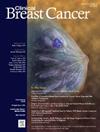MRI Response Pattern of Breast Invasive Micropapillary Carcinoma After Neoadjuvant Chemotherapy: A Matched Cohort Study With Invasive Breast Cancer of no Special Type
IF 2.5
3区 医学
Q2 ONCOLOGY
引用次数: 0
Abstract
Introduction
Neoadjuvant chemotherapy (NAC) is more widely used to treat localized invasive breast cancer. Invasive micropapillary carcinoma (IMPC) is considered more aggressive than invasive breast cancer of no special type (IBC- NST), as an independent histological type of invasive breast cancer (IBC). However, it is rarely reported about the response of IMPC to NAC. Therefore, we compared the NAC response of IMPC and IBC![]() NST groups to provide an evidence-based foundation for precise clinical management of breast IMPC about NAC.
NST groups to provide an evidence-based foundation for precise clinical management of breast IMPC about NAC.
Methods
The retrospective study included 127 patients with pathologically confirmed IMPC or IBC![]() NST patients from December 2016 to April 2021, and divided them into 3 group. The MRI feature and Clinicopathologic data of all the patients were assessed before and after NAC. One-way ANOVA test and Krukal-Wallis test were used for statistical analysis.
NST patients from December 2016 to April 2021, and divided them into 3 group. The MRI feature and Clinicopathologic data of all the patients were assessed before and after NAC. One-way ANOVA test and Krukal-Wallis test were used for statistical analysis.
Results
After NAC, IMPC patients showed less changes in lesion size, EER, shrinking rate and ADC values compared to the IBC patients (P < .05). In IPMC patients, 7.7% of lesions achieved a pathologic complete response (pCR), 61.5% with partial response (PR), 2.6% with progressive disease (PD) and 28.2% with stable disease (SD). Moreover, the lesions response to NAC was not significantly different between IMPC group and IBC2 group.
Conclusions
Most patients with IMPC can obtain the same PR rates after NAC as IBC![]() NST. Breast-conserving treatment (BCT) can be applied in More patients with IMPC. Therefore, we hold the opinion that NAC can be strongly suggested to be used for IMPC patients.
NST. Breast-conserving treatment (BCT) can be applied in More patients with IMPC. Therefore, we hold the opinion that NAC can be strongly suggested to be used for IMPC patients.
新辅助化疗后乳腺浸润性微乳头状癌的MRI反应模式:与无特殊类型浸润性乳腺癌的匹配队列研究。
新辅助化疗(NAC)被广泛应用于局部浸润性乳腺癌的治疗。浸润性微乳头状癌(Invasive micropapillcarcinoma, IMPC)是一种独立的浸润性乳腺癌(Invasive breast cancer, IBC)的组织学类型,被认为比浸润性无特殊类型乳腺癌(Invasive cancer of no special type, IBC- NST)更具侵袭性。然而,关于IMPC对NAC的反应却鲜有报道。因此,我们比较了IMPC组和IBCNST组的NAC反应,为NAC相关乳腺IMPC的精准临床管理提供循证依据。方法:回顾性研究2016年12月至2021年4月127例经病理证实的IMPC或IBCNST患者,将其分为3组。对所有患者行NAC前后的MRI特征及临床病理资料进行评估。采用单因素方差分析和Krukal-Wallis检验进行统计分析。结果:NAC后,IMPC患者病灶大小、EER、缩小率、ADC值的变化均小于IBC患者(P < 0.05)。在IPMC患者中,7.7%的病变达到病理完全缓解(pCR), 61.5%达到部分缓解(PR), 2.6%达到进展性疾病(PD), 28.2%达到稳定性疾病(SD)。此外,imc组和IBC2组对NAC的病变反应无显著差异。结论:大多数IMPC患者在NAC后的PR率与IBCNST相同。保乳治疗(BCT)可应用于更多的IMPC患者。因此,我们认为强烈建议对IMPC患者使用NAC。
本文章由计算机程序翻译,如有差异,请以英文原文为准。
求助全文
约1分钟内获得全文
求助全文
来源期刊

Clinical breast cancer
医学-肿瘤学
CiteScore
5.40
自引率
3.20%
发文量
174
审稿时长
48 days
期刊介绍:
Clinical Breast Cancer is a peer-reviewed bimonthly journal that publishes original articles describing various aspects of clinical and translational research of breast cancer. Clinical Breast Cancer is devoted to articles on detection, diagnosis, prevention, and treatment of breast cancer. The main emphasis is on recent scientific developments in all areas related to breast cancer. Specific areas of interest include clinical research reports from various therapeutic modalities, cancer genetics, drug sensitivity and resistance, novel imaging, tumor genomics, biomarkers, and chemoprevention strategies.
 求助内容:
求助内容: 应助结果提醒方式:
应助结果提醒方式:


